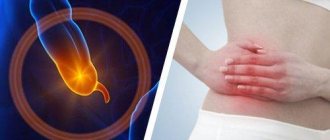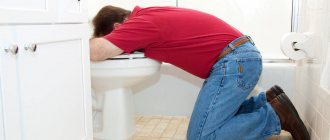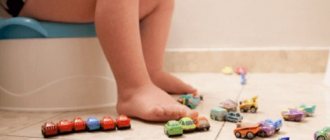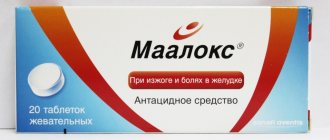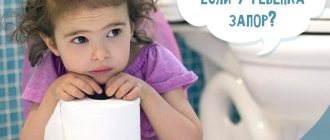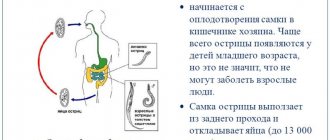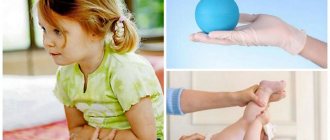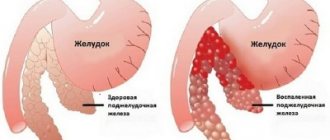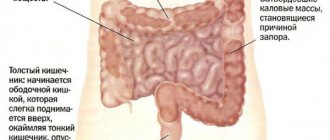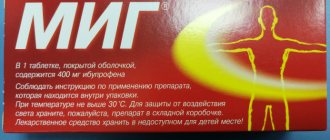From a physiological point of view, hiccups are a jerky contraction of the diaphragm, which results in a nonspecific disturbance of external respiration. Subjectively, a person feels unpleasant and intense respiratory movements, which occur quite often.
What happens during hiccups? This is an involuntary physiological reaction caused by synchronously occurring myoclonic contractions of the diaphragm, as well as intercostal muscles.
Due to muscle contraction, an imitation of a fixed inhalation occurs, but the sudden closure of the airways by the subpharyngeal cartilage (epiglottis) blocks the flow of air. Simultaneously with the epiglottis, the glottis also closes - this causes a short, strangled sound that is heard during hiccups.
Hiccups : as soon as the diaphragm contracts, air is pushed out of the lungs, which, passing through the larynx, closes the glottis and epiglottis, producing a characteristic “IR” sound.
Hiccups in newborns
Hiccups are a natural process. In a newborn child, it often occurs due to insufficient maturity of organs or due to adaptation to the environment. By the year the number of attacks decreases. Like an adult, a baby develops seizures from cold, hunger, fear, or overeating.
A baby may hiccup after bathing, while changing clothes, after eating, or from laughing. There are many reasons for the reaction, as well as ways to eliminate the phenomenon. Often, hiccups go away on their own and do not require treatment. Rarely is a sign of a disease of the digestive system or nervous system.
Why does a person hiccup?
There are a number of safe causes of hiccups in adults and children:
Idiopathic hiccups
Hiccups can occur for no reason (idiopathic). It lasts no more than 10-15 minutes, passes very quickly and does not cause discomfort. Hiccups are an unconditioned reflex that cannot be induced artificially.
Psychogenic hiccups
It often occurs in young anxious girls against a background of excitement and anxiety, for example, before an exam, interview, or public speaking.
Interesting fact: Since 1922, a certain Charles Osborne, a native of Iowa, began to hiccup while cutting a pig. He is listed in the Guinness Book of Records as the person who hiccuped continuously for 68 years. At first, the frequency of hiccups was 40 r/minute, then it became less frequent, 20-25 r/minute. Charles led a normal life, the hiccups stopped in 1990, and a year later he died of a stomach ulcer (at the age of 97).
Hiccups due to irritation of the vagus nerve
This nerve passes from the thoracic cavity to the abdominal cavity. On its way, paired with the esophagus, it passes through a narrow opening in the diaphragm, where it can be pinched. This happens when:
- overeating
- eating too fast
- fright
- being in an awkward position
- When a person hiccups after eating, most likely he overate or was in a hurry, swallowing large pieces of poorly chewed food.
Pathological causes of hiccups
But hiccups are not always harmless. There is a long list of pathological factors that can provoke hiccups:
- CNS lesions. If a person hiccups all day long, and the hiccups are debilitating, and this phenomenon is frequent, this may indicate possible encephalitis, stroke, head injury, or brain tumor.
- Metabolic disorders such as uremic, diabetic or hepatic coma.
- Intoxication of the body with muscle relaxants, barbiturates. You can often see a picture where a drunk person hiccups for a long time - the reason is alcohol intoxication.
- Spinal pathology - intervertebral disc herniation, circulatory disorders in the vertebrobasilar system, in diseases of the spinal cord and cervical spine (tuberculosis, tumors).
- Pathology of the gastrointestinal tract - subphrenic abscess, pancreatitis, diseases of the biliary system, reflux esophagitis, esophageal diverticulum, gastritis, gastric ulcer and duodenal ulcer.
- Oncological pathology, such as lymphogranulomatosis, sarcoidosis, esophageal tumors, lung cancer, mediastinum, stomach, pancreas, liver cancer.
- Increasing intracranial pressure (see increased intracranial pressure in a child)
Pathological hiccups never go away in 5-10 minutes; a person hiccups often, and an attack can last for hours. It often repeats and bothers a person for a long time. At the same time, the reasons that could provoke hiccups are difficult to determine (eating, hypothermia, etc.).
Types of attacks
Parents often feel very anxious about the sudden onset of the reflex. Doctors are sure that there is no reason to worry, hiccups are a natural phenomenon and absolutely harmless. In rare cases, indicates a serious pathology. Hiccup attacks are divided into two types: episodic and continuous.
Episodic
The type is characterized by sudden occurrence. Hiccups appear unexpectedly, for no apparent reason, and quickly disappear. Lasts no more than 15 minutes. The attacks are safe and can be easily eliminated independently or using traditional methods.
Long lasting
Attacks occur regularly over a long period. May be accompanied by symptoms: headache, tearfulness, nausea, vomiting after feeding. If you have symptoms, you should consult a doctor to determine the cause. Such hiccups may indicate serious health problems in the baby.
The mechanism of hiccups
The causes of hiccups are not fully known to modern medicine and science.
However, there are generally accepted ideas about why a child hiccups. At different ages, the causes of hiccups may be different. One-time cases of hiccups have the following causes:
- thirst;
- binge eating;
- hypothermia;
- diet with a predominance of dry food;
- nervous overexcitation of the child's psyche.
Also, episodes are provoked by air entering the stomach if the child cried or laughed for a long time. The appearance of hiccups after eating may indicate consumption of carbonated drinks or expired foods.
The diaphragm is a large muscle that is located on the border of the thoracic cavity with the abdominal cavity. If it is relaxed, it resembles a dome; when tense, it flattens. Along with the flattening of the diaphragm, the volume of the chest cavity increases, and the lungs expand when inhaling. The intercostal muscles also work together with the diaphragm; together they expand the chest.
During hiccups, the process described above occurs at an accelerated rate, muscle work is unsmooth and jerky. At the same time, the vocal cords are in a closed state and instead of a normal inhalation, only a peculiar sound is produced that accompanies hiccups.
The mechanism of hiccups is also mediated by the nervous system, namely the vagus and phrenic nerves. The line of exciting impulses passes precisely along these nerves, and if you open the reflex arc by influencing one of its links, you can stop it.
The occurrence of hiccups is closely related to the functioning of the nervous, digestive and respiratory systems. This means that disorder in one or another organ can provoke this unpleasant sensation.
Ways to eliminate attacks
Reflex contraction of the diaphragm is not a disease, in most cases it is not even a sign of pathology, and there is no need to treat the phenomenon. But if the attack frightens the baby and interferes with sleep, the parent is obliged to help get rid of the hiccups by removing the provoking factor. Ways to quickly eliminate the phenomenon, depending on the causes:
- If the baby hiccups because he is cold, you need to check the diapers. Wet bed linen should be changed, the baby should be changed and wrapped in a blanket. It’s easy to check whether a child is cold by touching the baby’s neck and limbs. A cold neck indicates that the temperature is uncomfortable for the child. You need to dress the baby in warm clothes and take him in your arms.
- A baby may hiccup if he has eaten too much or swallowed air during feeding. It is possible to rid the baby of excess air by holding him in an upright position for several minutes. Excess air and food will come out - the child will feel better.
- The child is thirsty and hungry. It is easy to quickly help the baby by offering the breast or a teaspoon of warm water. Artificer to apply the mixture.
- If the baby has colic, place a warm diaper on the tummy or stroke the tummy in a clockwise circular motion.
- A baby hiccups if it is scared. It is recommended to remove irritants and muffle sound sources. It is better not to allow crowds of people in the house where the baby lives, at least at first.
- When bathing in warm water covering the baby's tummy and chest, the symptom quickly disappears.
You can eliminate this unpleasant phenomenon by placing the child on his stomach and lightly massaging his back. It is recommended to go for a walk with your baby.
With reflux disease of the stomach, the newborn has protein intolerance. The child has no appetite, belching and hiccups occur. It is worth removing cow's milk protein from the diet and including an anti-reflux mixture. After feeding, the baby should not be carried in a column; it should be placed on its back, with its head slightly raised. The condition is fraught with diseases of the abdominal organs and central nervous system.
Use of herbal remedies
Chamomile helps relieve diaphragm spasms. It is easy to make a decoction in several ways:
- Buy filter bags at the pharmacy. Brew one sachet with 200 ml of boiling water and leave for half an hour.
- Brew the chamomile mixture, strain and let cool.
It is enough to drop a few drops of the decoction under the baby’s tongue, and the reflex will disappear.
Dill water helps eliminate colic and bloating in the stomach. Dill seeds need to be brewed with boiling water and left for half an hour. Strain and give the baby a teaspoon three times a day. Fennel tea in filter bags is effective.
How to get rid of hiccups?
Although, as mentioned earlier, hiccups are a short-lived phenomenon, they can cause some inconvenience to the child. And to be honest, a fully grown person doesn’t like to hiccup, even if it’s only for 10 minutes.
How can you quickly stop hiccups in your child ? If you do not take into account various folk methods like conspiracies like “hiccough, hiccup, go to Fedot,” then you can list several very effective methods .
You should invite the child to stand on his toes and put his hands behind his head, and then give him a few sips of water, always cold . The number 10 is usually called. Why exactly ten sips is unknown, but this method really works in most cases.
Actually, you can do without any special poses and just give the baby water ; It would be nice if it were sweetened - after all, sweets can also stop a hiccup attack. An unpleasant spasm can also be suppressed by simply eating half a teaspoon of granulated sugar .
Ice is also a good help in the fight against hiccups; You can add it to water, or you can swallow a small piece.
Another product that helps get rid of diaphragm contractions is lemon . Of course, not all children love it, but if you sprinkle a lemon drop with a little sugar, then it can turn into the most delicious medicine.
The following exercise helps to calm the attack - the child needs to grab his tongue with his thumb and forefinger, stretch it out a little and hold his breath for a while . This is undoubtedly the most fun method.
The following technique is no less interesting for children: you need to immerse your face in water for a few seconds, first inhaling, and then slowly release the air from your mouth under water , which will create a gurgling effect. In this case, it is important not to swallow water, so it is not suitable for very small children; To stop your little one’s hiccups, it’s better to just wash his face with cold water.
Advertisement
A couple more exercises : 1) the baby needs to inhale, raise his arms and stretch upward, and then, along with the exhalation, lower his arms and relax; 2) the child should sit down, take a deep breath, bend over, clasp his knees with his hands and hold his breath, then you can exhale and straighten up.
Information for parents. All of the above methods work and are absolutely safe, in contrast to some very dubious recommendations that can be heard mainly from representatives of the older generation.
So, in no case should you do the following things when you have hiccups :
- Smearing a child’s tongue with mustard or vinegar can cause laryngeal spasms or allergies;
- Giving a baby a teaspoon of salt to swallow is not only extremely unpleasant, but also extremely harmful to the child’s body;
- Trying to artificially induce vomiting can cause disgust and psychological trauma in a child;
- Giving children valerian or corvalol - what is suitable for adults is completely unsuitable for children.
And one more important warning. Some would-be experts claim that to prevent hiccups, you need to scare the child well, which, supposedly, will instantly stop the attack. This is complete nonsense - in this way you can provoke a serious illness in your child, for example, stuttering or enuresis , which will be much more difficult to get rid of than hiccups.
Prevention
To prevent hiccups from bothering your newborn frequently, it is important to follow the rules. It is contraindicated to frighten an infant; the child should be dressed according to the weather, avoiding hypothermia and overheating.
If the baby is breastfed, the mother should know what is allowed and what is not allowed to eat. You should not eat foods that can cause gas. Fatty foods and raw vegetables, carbonated drinks are not recommended.
Feeding your baby should take place in a calm environment. It is better to remove external stimuli in the form of bright light or loud sound. In infants, hiccups occur due to improper latching of the chest. The baby takes the breast incorrectly - air comes in with the milk, which puts pressure on the diaphragm.
A baby drinking formula from a bottle may experience hiccups due to the large flow of food through the large hole in the nipple.
It is contraindicated to overfeed a child; excess food stretches the small stomach. The organ puts pressure on the diaphragm.
Fasting a newborn is also prohibited. Doctors advise feeding the baby on demand. A hungry baby greedily consumes food, swallowing air along the way.
When feeding through a bottle, you need to hold it at an angle so that the air remains at the top. It is recommended to use a special anti-colic bottle for feeding newborns.
What other reasons cause hiccups?
A newborn often hiccups without any connection with feeding. Mom is worried because she is following the pediatrician’s feeding instructions, but the baby’s hiccups are not going away. It is important to understand here that there are other reasons for its appearance. Experts believe that the provoking factors are:
- An excited state during emotional shock. Due to the weakness and instability of the nervous system, infants may be frightened by something unusual (for example, an unfamiliar environment, loud sound, bright light), and an anxious state appears, leading to a spasm of the diaphragm.
- Everyone knows that hypothermia is a sure sign that a baby will develop hiccups. A caring mother should touch the baby’s nose, arms, and legs; if they are cold, it means he is frozen. Hypothermia can occur due to poor thermoregulation in children, so it is necessary to maintain a constant body temperature, wear socks and a blouse so that the child does not freeze.
- Sometimes hiccups occur during sleep; pediatricians also give a scientific and practical explanation for this. If a newborn is sleeping and hiccups in his sleep, it means that the diaphragm contracts, the vocal cords close, and the result is a sound that frightens the parents. The baby wakes up on his own, as it becomes difficult for him to breathe. To eliminate the discomfort and help the baby, the mother needs to take him to her chest, hold him in an upright position and press her stomach to her to warm and calm him down.
By holding the baby close to her in an upright position, the mother promotes the gradual release of air and normalization of the position of the internal organs
When to see a doctor
The phenomenon does not require medical treatment if it does not affect the newborn’s eating and sleeping. Some babies hiccup more than three times a day for up to an hour. This process requires special attention from parents and the attending physician.
The reason for the occurrence of the phenomenon in the state of health of the baby’s internal organs is to help the child; getting rid of the symptom on your own is pointless. In this case, you will need qualified help from a doctor. It is recommended to consult a doctor if your baby:
- Frequent, prolonged reflex contraction of the diaphragm;
- Nausea and vomiting after feeding;
- Tearfulness, anxiety.
Frequent attacks combined with dissimilar symptoms look like signs of pneumonia, pathologies of the digestive system, and infectious diseases. If the symptoms do not disappear in the absence of provoking factors, the help of a doctor is required. The doctor will write out a referral for an ultrasound examination of the gastrointestinal tract. He will give a referral to a gastroenterologist or neurologist to identify the cause. A laboratory study of the child’s biological material and in-depth hardware diagnostics of the organs may be required.
The occurrence of hiccups in a child of the first year of life is a common occurrence. Most often, parents do not need to do anything - the attack goes away on its own after a few minutes. If the process drags on and worries the child, it is better to tell the observing pediatrician about the situation. If a disease is suspected, the doctor will prescribe examination and treatment for the baby.
Hiccups in different situations
Attacks of hiccups occur in a small child in the most unexpected situations: during sleep, from cold, during feeding, after laughing, during conversation.
Let's look at the reasons for each of them. Sleep for newborns is an inactive phase of growth and development. All organs, except the thyroid gland, rest, and the main hormonal gland produces a large amount of hormones necessary for the maturation of the baby.
Hiccups in a dream interrupt this process, the baby wakes up due to a sharp muscle contraction, and may cry from fright. Typically, diaphragm spasm at night lasts no more than 15 minutes and goes away on its own. There is no need to stop it with water or feeding.
This situation can be explained as follows:
- The baby hiccups in his sleep due to the cold. Thermoregulation in children under one and a half years of age is imperfect. The child could freeze, wet himself, or lean against the cold wall of the bed. To get rid of nighttime hiccups, warm the baby, put on dry and warm pajamas, change the diaper, and carry the baby in your arms.
- The baby is thirsty. If the room is hot, the heating systems are running, and the mucous membrane dries out quickly. Lack of moisture in the mouth causes hiccups. Give the baby some warm water and put him to bed.
- The baby's nervous system became overexcited during the day. In a dream, the baby relives the past day if it was full of emotions. The muscles may be slightly tense and cause diaphragm spasm. The baby will wake up frequently. If the situation repeats several evenings in a row, try to make the atmosphere at home calm, avoid noisy guests and stress. This does not mean that you need to stop seeing friends and relatives, but it is advisable to take a break of a few weeks.
This problem is unlikely to affect a one-week-old baby; hiccups after laughing occur in children aged 4–5 months. From a physiological point of view, laughter is an involuntary movement of the muscles of the body and face with the simultaneous pronunciation of specific sounds.
The functioning of the respiratory system also changes during laughter. The child takes a deep breath, the nerve on the diaphragm is pinched, the air remains inside. To exhale, the chest produces sharp shocks. If the air is partially released, the nerve does not relax completely and hiccups will begin. The attack does not last long. Give your child some water after he laughs and calms down.
It happens that a two-month-old baby wants to coo and begins to hiccup heavily. The cause of involuntary spasms is the strong inspiration before articulation. The baby cannot exhale all the air, his chest expands, and the diaphragm contracts.
Some children, when hiccupping in a conversation, twist their legs and fidget, air comes out along with belching and food debris. This is fine. Articulation will be easier after the baby is verticalized, closer to 6–7 months.
Severe hiccups after and during feeding are a sign of errors in caring for a newborn. The mother needs to pay attention to the position of the baby during meals, how many times a day she feeds the baby and the volume of formula drunk. Hiccups are common in babies who are not held properly to give the breast or bottle when they overeat.
There will be no need to stop hiccups if mothers follow simple rules:
- The baby's head should be raised during feeding; he can lie on a pillow or the mother's arms.
- Allow your body to rest freely, no need to squeeze your tummy, chest, or tighten your legs. Let the child lie down as comfortable and comfortable as possible.
- Don't be nervous while feeding. It is better if both mother and baby are calm.
- The baby should grasp the nipple or silicone nipple completely. It will be impossible to swallow air like this.
- Do not enlarge the hole for rapid flow of the mixture. The liquid should not run quickly.
- If there is a lot of milk in the breast, the baby cannot cope with its flow, the mother needs to express a little next time.
- Do not remove the nipple from the baby's mouth by force. He will release the breast on his own when he is satisfied.
- Don't take too long a break between meals. A hungry baby grabs a bottle or nipple greedily, so he swallows air along with food.
- Do not force the baby to eat if he cries or hiccups. It's better to calm down and play first.
- Keep it in a column after meals, let burps and excess milk go away. Air will leave the stomach along with the food.
If a child hiccups after each feeding, behaves restlessly all day, or refuses food, you need to seek medical help.
Regurgitating a small amount of milk after feeding is a normal physiological process for children under one year old, sometimes up to one and a half years old. This is how excess food and air escape. This facilitates the digestion process, the baby will not suffer from colic and bloating.
If a newborn hiccups after regurgitation, it means that he swallowed a lot of air while sucking the breast, the food remained in the esophagus and prevents the air from coming out. You need to hold the baby vertically in your arms for 1–2 minutes, do not give him anything to drink. There is no need to see a doctor in such situations.
The culprit behind the contraction of the diaphragm muscles is cold. Dry your baby directly in the bathroom, do not change clothes with the windows open.
The fight for warmth should not be fierce. Cool air and air baths are useful for newborns for hardening at home. You need to stop hiccups from hypothermia with the help of warm clothes, water, or the next feeding in the correct position in the mother’s arms.
You can simply laugh and say that the loving grandmother remembers the baby all day long, according to popular belief, but prolonged hiccups cause a lot of inconvenience for babies. The baby cannot eat, sleep, or play normally.
Hiccups for no more than an hour, 1–3 times a day for up to six months or a year, are considered normal and are explained by the imperfect functioning of children’s internal organs. If the symptoms of hiccups do not disappear for a long time, the condition continues for several days, you need to deal with the problem together with a doctor. In the first 1–2 days, you can try to reconsider the diet of mother and baby, making sure that the baby does not become overcooled.
How often does your baby hiccup during the day?
How to help your baby
Some women, while still carrying a future baby under their hearts, prefer to study in advance all the information that will be useful to them in the future, and are engaged in preliminary preparations for the upcoming care of the baby. Some questions worry them throughout the entire pregnancy - why the child often hiccups, for example, and how to deal with it. Here are some useful tips on this issue:
• Monitor your baby while feeding. You should not give your baby the breast while holding him in a horizontal position, as he will “get enough” of air rather than milk. You should also carefully choose the pacifier with which your newborn will feed. It should be ideal for feeding your baby.
• Avoid loud noises, bright lights and other irritating factors around your baby. By doing this you will prevent the occurrence of fear and attacks of hiccups.
• After bathing, wrap your child in a warm blanket. It is advisable to carry out this procedure as quickly as possible so that the baby does not have time to freeze.
• Do not overfeed your child. The fact is that an overfilled stomach puts pressure on the diaphragm, which causes its convulsive contraction. Feed your baby smaller portions. Very often this problem occurs with older children, so in order not to be tormented by the question of why a two-month-old baby often hiccups, do not try to force food into the baby.
• Give the baby a few drops of lemon juice under the tongue or a little freshly brewed chamomile. This should affect the hiccup process and stop it. It is worth remembering that this miraculous remedy should be used only in the most extreme cases.
Here are some tips that will help you in the process of caring for a tiny lump, if followed, you will not have the question of why your child often hiccups.
What to do if your child hiccups all day?
The first thing parents should do when they notice their child has hiccups is to check if he is hypothermic. If the baby has cold hands and/or feet, he should be dressed warmly, given a warm drink, and covered with a blanket. It is important to ensure that the child does not become overexcited, limit watching emotional cartoons and TV shows, and at the first signs of excitement, gently divert his attention to other activities.
It is necessary to maintain a water-drinking regime; during meals, you must ensure that the child does not rush and chews each piece thoroughly. From time to time, the baby needs to be offered drinks - water, compote, herbal teas. They not only saturate the body with moisture and vitamins, but also calm the nervous system.
There are certain hiccup remedies that are suitable for adults. Never try them on your babies, as getting rid of hiccups in a newborn can have adverse consequences.
- Never try to scare your newborn if they are hiccupping to get them to stop hiccupping. The loud bang of an exploding plastic bag, commonly used for hiccupping adults, can cause damage to infants' sensitive eardrums.
- Sour candies are great for adults, but are not intended for children. Even if your baby is over 12 months old, it is not recommended to feed him sour candy or other acidic foods to relieve hiccups. Most sour candies contain powdered edible acid, which may not be healthy for your baby.
- Don't slap your child too hard on the back. The ligaments in your baby's skeleton are still flexible, and any shock or brute force can cause serious damage to them. For this reason, never slap your baby hard on the back to prevent him from hiccupping. You can knock gently, but any excessive force may cause damage.
Hiccups in a child are a temporary nuisance. But if it repeats frequently, then it’s time to visit the doctor.
Hiccup, hiccup, go to Fedot
There are a huge number of ways to get rid of hiccups, ranging from spells - “hiccups, hiccups, go to Fedot”, to more specific, one might say, even acrobatic actions. There are more than 10 known ways to drink water correctly.
Despite all the variety, not all methods of “treating” hiccups can be used in children, and some of them will be downright dangerous.
The choice of means to treat hiccups will depend on the age of the baby. For infants, the best option is to change position and drink. And in the future, parents and the nursing mother (in the case of breastfeeding) must assess the situation of the occurrence of attacks, find and correct errors in attachment and feeding, and after feeding, hold the baby as a “soldier.”
If parents suspect that hiccups are associated with emotional or nervous stress, then it is necessary to calm the baby in time and prevent similar situations in the future.
The most universal and, most importantly, safest recommendation for stopping attacks of hiccups in children can be considered drinking water (warm, in small sips) and holding your breath.
It is strictly forbidden to scare a child during a hiccup attack, and you should also not force the child to dive into water and hold his breath.
Overeating, bloating and air intake
For example, a child under one year old, especially when feeding, takes in a lot of air in his mouth, and may also simply overeat. Because of this, he begins to hiccup. In this case, it is usually enough for the mother to hold the baby standing for a while so that he burps the excess and the hiccups stop.
If the baby overeats, then you should try to feed him less milk, but apply it to the baby’s breast more often. In addition, the child should not be hungry for a long time, this will promote excessive sucking and swallowing air into the stomach.
Also for the same reason, it is important to properly attach the baby to the breast. He should capture with his mouth not only the nipple, but also its areola ─ this way less air will get into his stomach along with the milk.
Excessive gas in the tummy and bloating can also cause hiccups.


